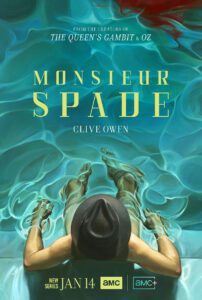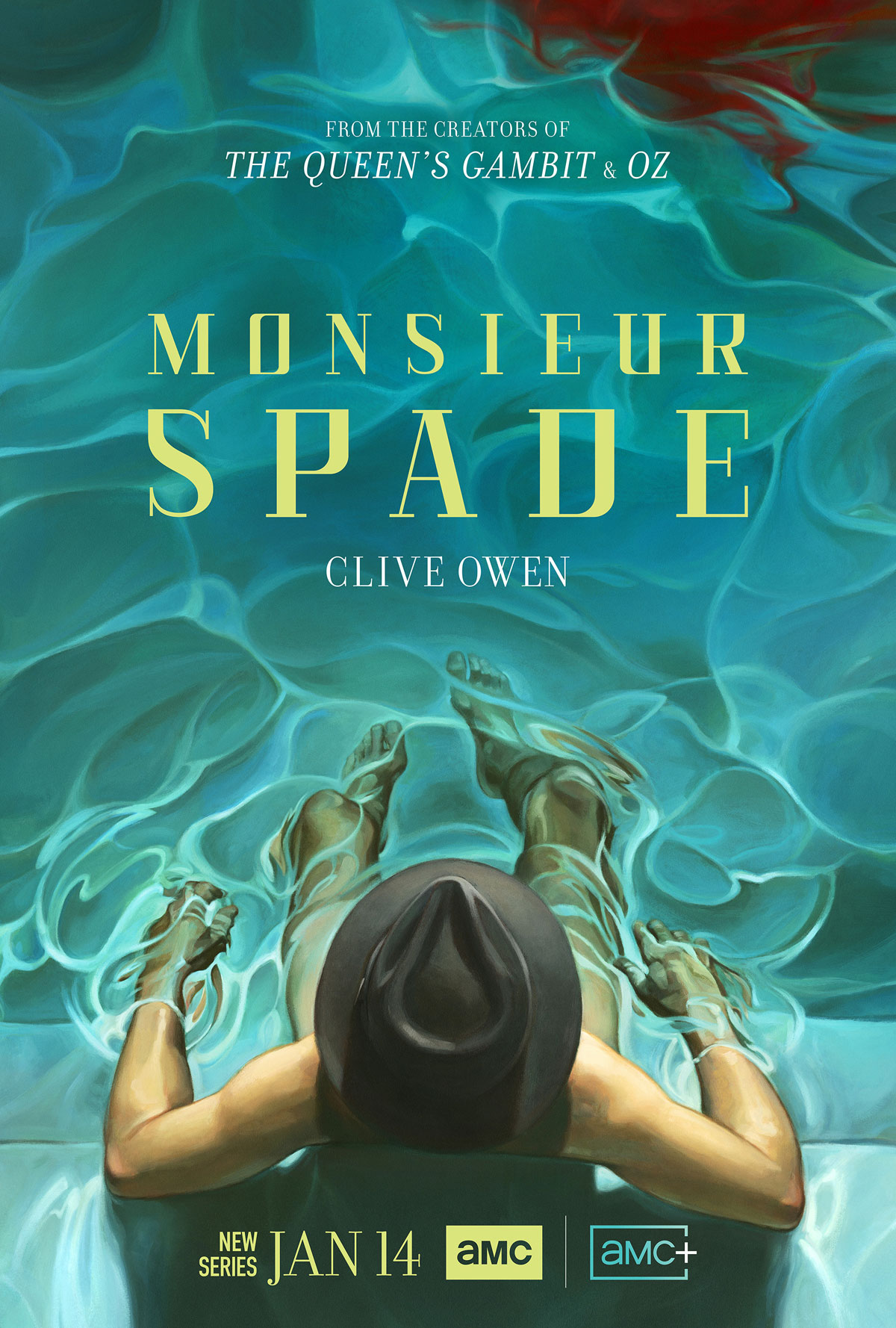
Network: AMC
Creator: Scott Frank
Season Year: 2024
Watch: AMC+
I took a film noir class in college. Because a friend and I created the easiest, most blow-offy minor ever: Cinema Studies. It’s not as though we created this film noir class, but could take it as part of a credit toward legitimacy. Which, all these years later, has turned into really bad takes on the Internet. The point is, we focused pretty heavily on the 1941 film, The Maltese Falcon. Starring one Humphrey Bogart as hard-boiled detective, Sam Spade. It’s a pretty weird movie, truth be told. And tiny Bogart is equally weird as the angry little man who seems to punch just about everyone he meets. And I seem to recall him forcibly squishing a woman’s face before planting one on her. He’s a complicated and not necessarily empathetic character. He rubs people the wrong way and is just generally pretty prickly. Which I suppose is what interested Scott Frank, the creator of Monsieur Spade, in taking this prototypical American bad boy and sticking him in the languid south of France in the waning days of his prowess as a detective. The ultimate fish out of water when it comes to this kind of thing.
So, why cast Clive Owen in this role? Notoriously not American, Clive Owen. Clive Owen, who I have complained about more than once on this very site when he’s cast in parts that require him to cover up his rather thick-ass British accent. Whose odd face and mannerisms have driven me almost to madness on several occasions? Well, it seems they’ve given him a somewhat more subdued personality than the original Sam Spade. Less juiced up and more… well, more retired, I guess. And definitely more mumbly. You know, to cover up the aforementioned accent. But to absolutely nobody’s surprise, he doesn’t in any way resemble an American. But amongst the other actors and their French accents, I suppose he’s less Euro sounding than he typically is. Still the dumb face, but there’s nothing anyone can do about that. Except for maybe cast someone else? Because, when it comes down to it, Brits do sarcasm and menace different than Americans. New York and New Jersey tough guy is very different than London tough guy. And San Francisco tough guy is way different than London tough guy. The delivery is just different. And while Owen is fine, he just doesn’t bring that bite that a New Yorker like Bogart or a Cagney. Or even the early San Fran toughness of a Clint Eastwood.
My pre-conceived wariness about Owen aside, the show has a lot of things going for it. First, it looks really rich. It’s shot really well, the scenes are lit immaculately and the scenery is cinematic. It feels like it’s well cared for and incredibly professional. The writing is snappy and Frank clearly threw in a bunch of stereotypical noir-ish dialogue to spice it up. Especially when Spade is going back and forth with his frenemy, Police Chief Michaud (Denis Ménochet). It’s not at all how real humans talk, but it’s fun and sometimes funny. Spade, the aging grouch, is definitely entertaining, even if his need to just be left alone sometimes gets in the way of honest-to-goodness character development. Anyhow, it’s nice to see France filmed in what I can only assume is France, and not Montreal. The town they filmed in is ancient and definitely gives you the sense that this is way earlier than the 1963 it’s supposed to be. Backwater France is very provincial and quaint. But, again, it all feels very put together.
Now, in terms of the plot. Well, it’s a bit convoluted. First, I didn’t know anything about the Algerian war. Mostly because I’m not French. But apparently it was a war fought from 1954 to 1962 between a revolutionary group called the National Liberation Front and the French for Algeria’s independence from their French colonizers. By all accounts, it was brutal, the French soldiers did all sorts of horrendous shit and it ultimately scarred both countries and caused all sorts of division within France and was just super-ugly and devastating to a whole generation of people. That war is at the heart of the series — so without that frame of reference, it’s tough to follow who is fighting whom and why the politics of that war were so divisive. And, honestly, even after watching it, I can’t quite understand what exactly happened. Other than the fact there’s a small Algerian boy with some sort of autistic ability to break codes who everyone wants to get their hands on. Which is a weird, weird thing to put at the center of this detective show that becomes less and less about detecting and less and less about Sam Spade as we progress through the season.
I’m not certain what I expected from this show. But whatever it was, this wasn’t quite it. Again, it looked nice. There was some fun dialogue. And the acting is relatively decent. But the plot gets way overly complicated and then it just gets stupid. Like really, really stupid. Luckily that’s not until the very end, however. When the whole thing just comes to a head on a bridge with a bunch of random people – several of whom have had no involvement throughout the series — in what amounts a poorly executed Mexican standoff. It’s head-shakingly terrible. Granted, there is some stuff leading up to this that is also super-weird and confounding. Not the least of which is a relationship between two characters that is very pivotal that comes completely out of nowhere. And, frankly, makes zero sense. It’s just a strange way to wrap things up seeing as the pacing of the show is otherwise even and parsed out pretty well. It feels like the French countryside. Lots of greenery, little cups of rich coffee, wine and cigarettes al fresco. Old churches, crumbling estates and silly, twee European cars that look like they’re made of Legos and old bicycle parts. You get it. Next season — and this hurts my heart a little based on my previous Clive Owen meh-ness — I really hope to get more Sam Spade in my Mr. Spade.


